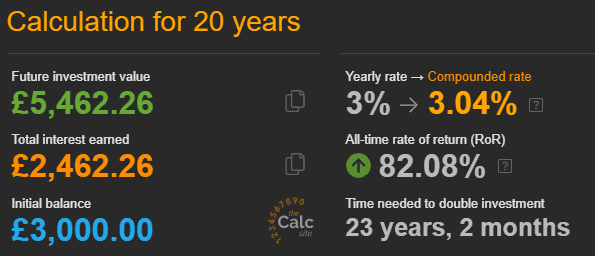Picture supply: Unilever plc
Falling rates of interest scale back the passive earnings that folks earn from their financial savings accounts. Many accounts that after held a gradual fee above 5% are actually falling as little as 3%.
As of late, holding a sum of round £3,000 in financial savings gained’t return a lot. As an example, in 20 years, a 3% fee would solely develop to round £5,462.

When factoring in inflation on the Financial institution of England’s 2% goal, it equates to little or no. Whereas many recognize the security and safety that financial savings accounts supply, some would possibly take into account in search of quicker methods to develop that cash.
Is there a (comparatively) protected option to goal for a extra significant return?
Danger vs return
Many shares on the FTSE 100 have traditionally delivered annualised returns upwards of 10% a yr. In actual fact, some have delivered much more (however with larger returns come larger threat).
What’s extra, many of those shares pay annual dividends upwards of 5%. Which means buyers have an opportunity of beating their financial savings account even when the inventory worth doesn’t develop in any respect.
However the threat of losses is regarding. Cash stagnating in a financial savings account isn’t very best however shedding all of it is worse. That’s the core motive why many individuals by no means make investments — the market is complicated and even a small threat appears too excessive.
Take into account defensive shares
Whereas no funding is with out threat, some are thought-about to be low threat. These are usually firms in high-demand industries. Assume vitality, retail and prescribed drugs.
They’re often trade leaders, with restricted competitors and a historical past of dependable efficiency. Observe, ‘dependable’. Not distinctive, not mind-blowing. Simply gradual, regular and steady.
Such shares are sometimes called defensive shares, as their efficiency is proof against wider market fluctuations.
Take into account the multinational shopper items firm Unilever (LSE: ULVR). Between 2014 and 2024, it achieved annualised development of 5.7% a yr. And that’s earlier than dividends, which at the moment yield 3%.
Certain, it doesn’t maintain a candle to parabolic development shares like Nvidia. However the place will or not it’s in 10 years? Who is aware of.
Promoting important manufacturers like Dove, Ben & Jerry’s, Hellmann’s and Vaseline, Unilever’s well-positioned to proceed rising indefinitely.
However that doesn’t assure development. It might nonetheless lose market share to rivals or endure losses because of provide chain disruptions. Something from environmental disasters to foreign money fluctuations can harm income.
And if it passes these prices on to the buyer, it dangers shedding clients to low-priced alternate options.
Nonetheless, with merchandise utilized by 2.5bn folks day by day in 190 international locations around the globe, its market place could be very well-established.
Path to passive earnings
£3,000 would purchase round 65 Unilever shares. Assuming present averages held, in 20 years they might develop to be price virtually £16,000 (with dividends reinvested). I don’t know any financial savings account that might obtain that.
Nationwide Grid’s one other defensive inventory providing related reliability and development. As the primary fuel and electrical energy supplier within the UK, it enjoys constant demand. Development is gradual nevertheless it has a 5.7% dividend yield and an extended observe report of constant funds.
It might obtain related outcomes to Unilever over 20 years.
I plan to drip-feed my financial savings into these shares and related defensive shares till retirement. By compounding the beneficial properties, I hope to attain a dependable passive earnings stream.





